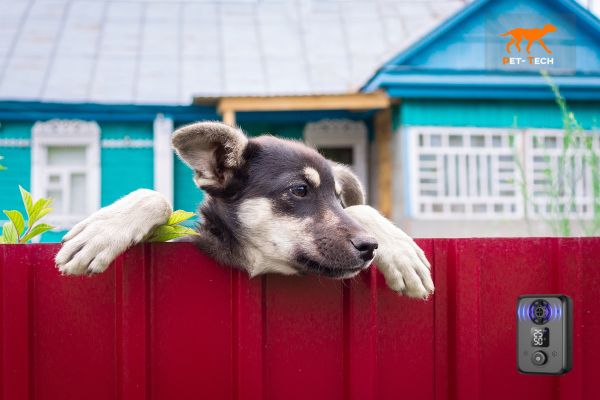Owning a dog can bring endless joy and companionship, but excessive dog barking can be a challenge for many dog owners.
All dogs bark naturally, but having a dog constantly barking for hours on end can quickly get on the nerve of both yourself and your neighbours.
Some of the questions we get asked a lot are how long can a dog bark legally in Australia and how much does a dog have to bark to complain? It varies across councils but technically any constant barking of over six minutes an hour is enough for a neighbour to put in an unpleasant complaint.
Respecting your neighbours and trying to reduce excessive dogs barking is part of being a responsible pet owner.
Long term excessive dog barking can also have its own health implications for the dog.
The good news is a dog barking continuously is a behaviour, and a behaviour is something that can be managed and corrected with the right tools and training techniques.
Understanding why dogs bark and learning how to manage and correct this behaviour is essential for a peaceful and happy home.
A constant dog’s bark is one of the top complaints and problem behaviours our customers come to us with at Pet Tech. The good news is that excessive dog
Let’s explore the reasons behind why dogs bark, identify common triggers, and provide the best tools and techniques to help manage excessive dog’s bark.
Understanding Why Dogs Bark
Let’s face it—all dogs bark. Barking is a natural form of communication for dogs amongst each other and other species including humans. They like to let us know if something is coming theirs and our way. Some dogs are simply more vocal than others as part of their personality. Certain breeds—including Terriers, Shepards, Beagles and Chihuahuas—are naturally inclined to bark more. However, when barking becomes excessive, it can be a sign that something is amiss in your dog's environment or behaviour.
Identifying Triggers That Make Dogs Bark
The first step in addressing excessive barking is to identify the triggers that cause your dog to bark. Common triggers include:
- Strangers or Other Animals: Dogs often bark at unfamiliar people or animals as a protective instinct. Or when someone enters their territory, eg: when a guest arrives at your house
- Boredom or Loneliness: Dogs left alone for long periods may bark because they feel bored or lonely.
- Attention-Seeking: Some dogs bark to get their owner's attention.
- Fear or Anxiety: Loud noises, new environments, or separation anxiety can cause barking. Eg: Thunderstorms, fireworks
- Playfulness or Excitement: Dogs may bark when they are excited or during play.
Understanding the specific triggers for your dog's barking can help you address the root cause of the behaviour.

Effective Training Techniques to Reduce Barking
Scolding a dog to stop barking is not very effective, unfortunately. Punishment methods can also lead to dog aggression and are not effective either. Once you have identified the triggers, you can begin to implement training techniques to reduce barking including:
- Positive Reinforcement: Reward your dog with treats or praise when they remain quiet in situations that typically trigger barking. This reinforces the desired behaviour.
- Desensitisation: Gradually expose your dog to the trigger in a controlled manner, rewarding calm behaviour and gradually increasing exposure until the trigger no longer causes excessive barking.
- Command Training: Teach your dog the "quiet" command. When your dog starts barking, firmly say "quiet" and reward them when they stop barking. Consistency is key to this method.
- Ignore Attention-Seeking Barking: If your dog barks to get your attention, avoid giving in. Wait for a moment of silence before rewarding them with attention.
- Provide Mental and Physical Stimulation: Ensure your dog gets enough exercise, socialisation and mental stimulation to prevent boredom-related barking. Regular walks, playtime, and puzzle toys can help keep your dog engaged and reduce barking.
- Seek assistance: if your dog's bark is not improving despite following these techniques. A vet can rule out any medical or anxiety-related issues to puppy barking excessively. Otherwise, consult with a dog behavioural specialist who can pick up on any techniques you are missing or tailor a training plan for your dogs barking.
Tools and Products to Help Manage Barking
In addition to these techniques, having the right tools dramatically improves the effectiveness of anti-bark training. Bark collars are an affordable and effective way to humanely train your dog out of excessive dog barking and are used by both professional dog trainers and new pet owners.
There’s a few different type of Bark Collars including:
- Electric bark collars utilise a very mild static shock and vibration to curb unwanted barking behaviour. All products are safe and vigorously tested for their safety and effectiveness.
- Vibrating Bark Collars are a preferred non-shock alternative that provide a completely safe but gentle vibration to the dogs neck when dogs bark excessively, curbing this behaviour.
- Citronella collars release a small citronella spray when dogs bark excessively. Dogs find the citronella smell unpleasant, but it is safe and non-toxic for them.
- Ultrasonic Dog training devices: Unlike collars, these deterrents emit ultrasonic high pitched sounds that only dogs can hear and find distracting and off putting. This deterrent device is ideal for people with multiple dogs or want to prevent dogs barking in certain areas of their property; like the courtyard of your property that is close to a neighbours home.
Achieving a Quieter Home with Pet-Tech Bark Collars
Don’t wait until you are at your wits end or until you get a complaint from your neighbours about excessive dog barking.
Correcting excessive barking requires patience, consistency, and understanding of your dog's behaviour. With these strategies and tools, you can take steps towards managing your dog's barking behaviour, ensuring a more tranquil home environment for both you and your pet.
Pet-tech bark collars can be a valuable addition to your training toolkit, helping to achieve a quieter home and a happier relationship with your furry friend.
Remember, a well-trained dog is a happy dog, and with the right approach, you can enjoy the peace and harmony you desire.





